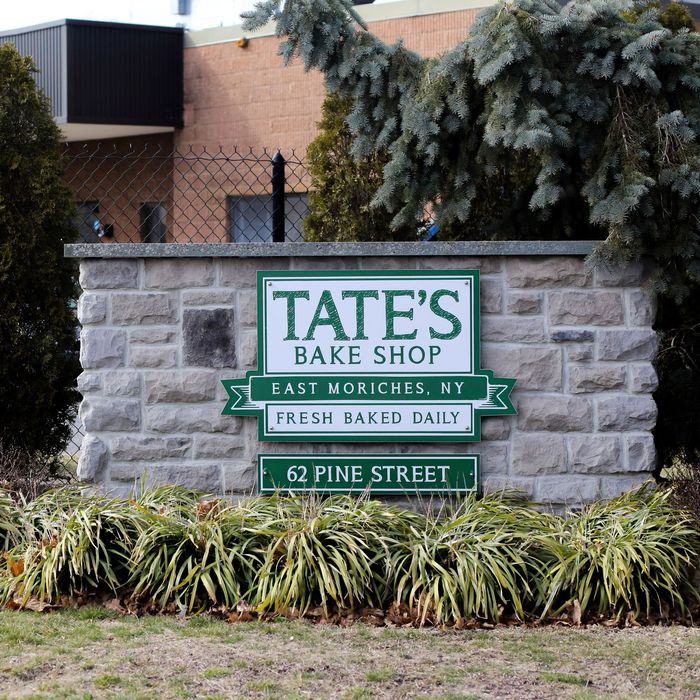
Every 30 minutes, roughly 7,560 thin-and-crisp cookies pass through the hands of packers inside the Tate’s Bake Shop manufacturing facility, tucked away in East Moriches, on the south shore of Long Island. Catalina, a 42-year-old undocumented worker who asked me not to use her real name out of fear of retaliation from her supervisors, calls the cookie company’s product line “the belt.” She says that the oven can sometimes dispense cookies that are too hot to handle, with only plastic gloves offering any protection. When I ask her to describe her shifts, for which she is paid $15.50 per hour, she says the same word, in Spanish, three times: rapido. Any slowdown from other workers could also cause a backup, a dangerous situation, and it creates an environment where workers must look out for themselves. “I’m not going to kill myself, burn my hands while another person is doing whatever they’re doing,” she tells me, through a translator. “People who eat these cookies don’t know how difficult it is to make them.”
We are sitting in a mostly empty storefront, a mile away from the factory itself. The Amalgamated Local 298 union is currently campaigning to organize 432 Tate’s employees, and Catalina feels it is too dangerous to speak to a journalist where any of her managers might see her. Reports have emerged that the company is threatening its undocumented workers with deportation, should they organize. Officially, a spokesperson for Tate’s tells me that the company “has never threatened employees with deportation and we never would,” and that Tate’s supports employees’ rights to organize, but another worker, who I’ll call Julio, says that management is trying to interfere with the vote to unionize, and the mail-in ballots that are due by April 21. “There are people at Tate’s who say, ‘We’ll vote on your behalf,’” Julio explains through a translator. “People authorized by the company.” Julio also tells me that management watches “every move I make,” that he is afraid he has been singled out by management and suspects that a January raise from $14.50 to $16 per hour would have been higher if he did not support the union, as other employees saw increases of up to five dollars. “Just because a worker wants to organize, wants to have representation,” he says, “doesn’t mean a company should make their life miserable.”
Tate’s got its start in 1970, when, as the New York Times once reported, Kathleen King “began baking cookies at the family farm stand in Southampton.” She was 11. In the ’90s, King sold two-thirds of Kathleen’s Bake Shop, as it was called, to new partners. (In an email, the author of that original report, Florence Fabricant, writes that, right now, when there is “incredible emphasis on women entrepreneurs and their accomplishments,” she believes Kathleen has set a “wonderful example” over decades with an “excellent local product.” She says the quality has held up as she expanded. “But there is also a lesson,” Fabricant warns: “Never sell your personal name.”) Meanwhile, a union push was happening inside Kathleen’s, according to documents filed with the National Labor Relations Board. In a 15-page decision, the NLRB noted that employees endured verbal abuse, retaliation, and other union-busting techniques. One employee, George Panatiotopoulos, alleged that King told him at one point, “You’re a pathetic excuse of a person. Go back to work, you bastard.”
The union effort nevertheless passed, but King was eventually fired by her new partners. So, in 2000, King quickly pivoted and opened Tate’s, naming the new bakery after her father, Richard “Tate” King. Notably, her employees were not represented by a union. The company quickly became known for its super-buttery, thin chocolate-chip cookies and eventually won public praise from celebrities like Rachael Ray. In 2018 Tate’s was purchased for $527 million by Mondelēz International, the bakery behemoth that owns brands like Oreo and Chips Ahoy. King — who did not respond to multiple requests to speak for this story — left the business.
Mondelēz recently made headlines after it announced that it would close two plants this summer, one in Fair Lawn, New Jersey, and another in Atlanta, as the company considered “changes to evolve its U.S. biscuit manufacturing footprint by focusing on strategically located bakery locations.” But Richard Nazzaro, the president of the Local 719 union, which has represented Nabisco workers in New Jersey since 1958, says that he was still at the bargaining table to finalize a 2016 contract with Mondelēz when the closures were announced. “Mondelēz was anti-union on steroids,” he says.
Now, there is fear among some that a similar fate might apply to the Long Island Tate’s bakery and its workers, should they vote to organize, though there’s no guarantee that the vote will pass. One first-year Tate’s employee, Efrain Villafane, a 64-year-old maintenance worker, tells me he is satisfied with his hourly wage — he says it’s “around” $30 an hour — and he doesn’t need to pay dues for the union to speak on his behalf because he can always go to HR.
Anthony Miranti, who is organizing the current union push for the Local 298, says he considers Tate’s to be a “decent place” with room to improve and points out the $500 million Mondelēz sales figure, in addition to the company’s $25.9 billion in global revenue. “I think the workers that produce these products should be able to put their heads down on their pillows at night and know their job is secured, that their family has the best coverage out there, that they’ll have a pension to retire on someday.”
Julio, the pro-union Tate’s employee, says he’s been heartened to see the increased media attention and says pressure from consumers could be helpful. But the current uproar is also causing headaches for another member of the King family, Richard King, the brother of Kathleen King and the son of the original Richard “Tate” King, whose name is emblazoned on every green bag that comes out of the East Moriches facility. “It’s a personal attack,” he says, pointing to articles like a story titled “Fuck You Tate and Your Union-Busting Bake Shop,” which appeared in light of the initial reports of deportation allegations. “It sucks,” says Richard, a second-generation farmer who owns a church near the Tate’s factory and who explains he didn’t have a stake in the company or a say in selling his family name to Mondelēz.
A few minutes before her 3 p.m. shift is set to begin, Catalina tells me her own opinion on the effort to unionize. “I’ve spoken to a lot of people who work in union shops,” she says. “They say things are better.” So, she adds, “Why not give this an opportunity?”
As she gets up to leave, she tells me that in her home country, she studied to be a nurse and that she sometimes thinks about what it would have been like to spend her days caring for women and children. Now, however, it’s time to get back to “the belt.” “I am so tired,” she says, “of looking at Tate’s cookies.”




